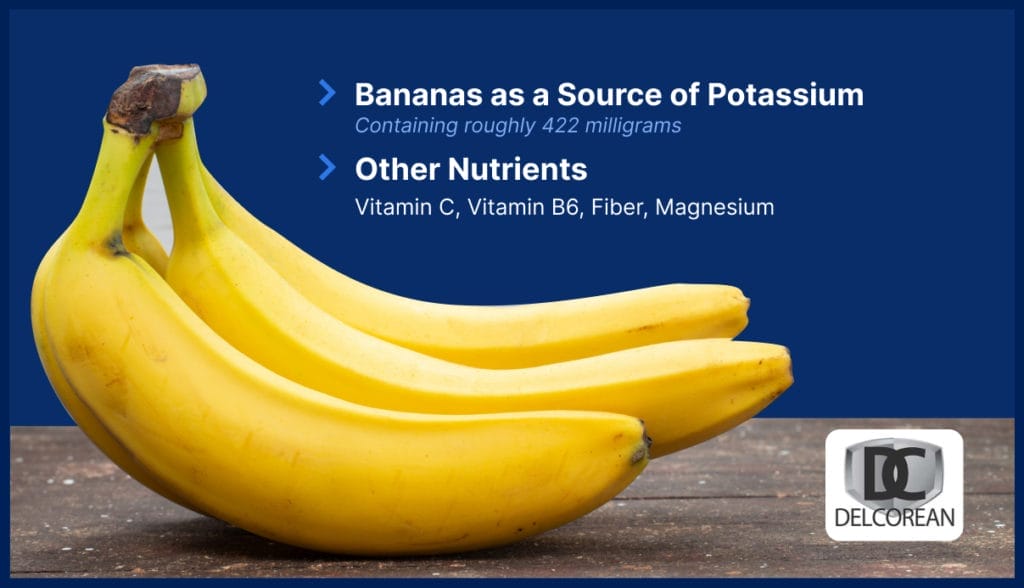Exploring the connection between bananas and leg cramps reveals a fascinating blend of nutrition science and common health advice. Many athletes and individuals with frequent leg cramps have turned to bananas as a natural remedy, thanks to their high potassium content.
This article explores the potential for bananas to alleviate leg cramps, examining both the nutritional components of bananas and their role in muscle function. Whether you’re an avid runner, someone who experiences nocturnal leg cramps, or are simply curious about the nutritional strategies for muscle health, you’ll find valuable insights here.

The Nutritional Profile of Bananas
Bananas are more than just a convenient snack; they’re packed with essential nutrients that play a vital role in maintaining your health. Renowned for their rich potassium content, bananas offer many benefits that extend well beyond the commonly known energy boost.
Bananas as a Source of Potassium
Potassium is crucial in muscle health, nerve function, and fluid balance within the body. Bananas are an excellent source of this vital mineral, with a medium-sized banana containing roughly 422 milligrams. This represents about 9% of adults’ Recommended Dietary Allowance (RDA).
The high potassium content in bananas can help regulate your heartbeat and blood pressure and is crucial in preventing muscle cramps, making them an ideal food choice for athletes and individuals prone to leg cramps.
Other Nutrients in Bananas
Beyond potassium, bananas are a treasure trove of several other beneficial nutrients:
- Vitamin C: Each banana provides about 10% of the RDA for vitamin C, an essential antioxidant for immune function, skin health, and iron absorption.
- Vitamin B6: Bananas are an excellent source of vitamin B6, with one banana providing around 20-25% of the RDA. Vitamin B6 is essential in metabolism, brain health, and hemoglobin production.
- Dietary Fiber: With about 3 grams per banana, the dietary fiber in bananas aids digestion, helps maintain a healthy gut, and contributes to prolonged feelings of fullness, which can assist in weight management.
- Magnesium: Bananas also contain magnesium, which is vital for bone health and energy production. A medium banana has about 8% of the RDA for magnesium.

Scientific Evidence on Bananas and Leg Cramps
The relationship between banana consumption and preventing or alleviating leg cramps has been a subject of interest in the scientific community for over a decade. This interest is primarily due to the high potassium content in them.
Several studies have explored this connection, focusing on athletes often prone to muscle cramps due to intense physical activity and electrolyte imbalances.
Research Findings
In a 2005 and 2010 study, research was conducted on Ironman triathletes and provided valuable insights into the role of nutrition and electrolyte supplementation in preventing muscle cramps. These studies found that while potassium intake is essential for overall health, it might not directly prevent exercise-associated muscle cramps (EAMCs). The cramps are more likely to be associated with muscle fatigue and neuromuscular control rather than solely with electrolyte imbalances.
Another study on Ironman triathletes in 2011 specifically examined their race times and history of muscle cramping. The study aimed to identify whether there was a correlation between faster race times, higher levels of physical exertion, and the incidence of leg cramps. The results indicated that while there was a relationship between increased intensity and muscle cramps, the direct impact of potassium intake from bananas on preventing cramps was inconclusive. Instead, it suggested that a multifaceted approach, including nutrition, hydration, and pacing, is necessary to effectively manage or prevent muscle cramps.
A significant study conducted in 2013 focused on the effects of mild dehydration on athletes and the occurrence of muscle cramps. The findings suggested dehydration and electrolyte imbalances could contribute to muscle cramps, highlighting the importance of maintaining hydration and electrolyte levels during prolonged physical activity. This study underscores the potential benefits of consuming bananas, with their high water content and potassium, as part of an overall strategy to stay hydrated and maintain electrolyte balance.
While bananas are a healthy addition to any athlete’s diet due to their nutritional profile, the direct relationship between banana consumption and the prevention of leg cramps is complex and influenced by multiple factors, including hydration status, electrolyte balance, and muscle fatigue. These studies highlight the importance of a well-rounded approach to nutrition and hydration for athletes, especially those engaged in endurance sports.
The Neuromuscular Theory
The Neuromuscular theory suggests that muscle cramps stem more from issues in neuromuscular control rather than traditional beliefs of electrolyte imbalances. This emerging perspective posits that cramps occur when there’s a malfunction in the mechanisms that govern muscle contraction and relaxation.
Factors such as muscle fatigue can disrupt the delicate balance between the excitatory signals, which prompt muscle contraction, and the inhibitory signals, which cause muscles to relax.
This disruption can lead to an overstimulation of the muscles, resulting in involuntary and sustained contractions commonly experienced as cramps, challenging the conventional focus on electrolyte deficits as the primary cause.
So, Can Bananas Help with Leg Cramps?
Yes, bananas can possibly help with leg cramps — their richness in potassium, a mineral that is essential for muscle health and nerve function, can aid in preventing cramps when paired with other factors. This happens by maintaining proper fluid balance and supporting normal muscle contraction and relaxation.
However, it’s important to note that while bananas contribute to a balanced diet and can help manage leg cramps, they are part of a broader approach to muscle health that includes hydration, nutrition, and proper exercise.
Start Preventing Leg Cramps Today!
While bananas and other solutions, like hydration and electrolyte supplements, have their place in a balanced diet and can aid in preventing leg cramps, they are not cure-alls. The evolving scientific landscape suggests that a more holistic approach, encompassing not just diet but also comprehensive fitness habits, is crucial in managing and preventing muscle cramps effectively.
If you want to embrace a well-rounded lifestyle that supports your body’s needs in multiple dimensions rather than seeking quick fixes through single-food remedies, talk to the professionals from Delcorean for more insights.


